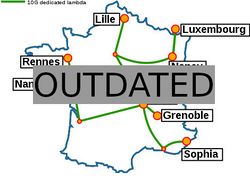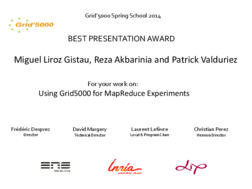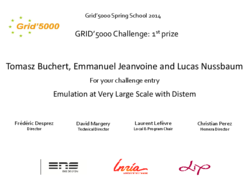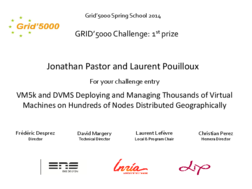Grid5000:Home: Difference between revisions
No edit summary |
No edit summary |
||
| Line 9: | Line 9: | ||
Key features: | Key features: | ||
* provides '''access to a large amount of resources''': 1000 nodes, 8000 cores, grouped in homogeneous clusters, and featuring various technologies: 10G Ethernet, Infiniband, GPUs, Xeon PHI | * provides '''access to a large amount of resources''': 1000 nodes, 8000 cores, grouped in homogeneous clusters, and featuring various technologies: 10G Ethernet, Infiniband, GPUs, Xeon PHI | ||
* '''highly reconfigurable and controllable''': researchers can experiment with a fully customized software stack thanks to bare-metal deployment features, and can isolate their experiment at the networking | * '''highly reconfigurable and controllable''': researchers can experiment with a fully customized software stack thanks to bare-metal deployment features, and can isolate their experiment at the networking layer | ||
* '''advanced monitoring and measurement features for networking and power consumption''', to provide a deep understanding of experiments | * '''advanced monitoring and measurement features for networking and power consumption''', to provide a deep understanding of experiments | ||
* '''designed to support Open Science and reproducible research''', with full traceability of infrastructure and software changes on the testbed | * '''designed to support Open Science and reproducible research''', with full traceability of infrastructure and software changes on the testbed | ||
Revision as of 22:46, 22 January 2015
|
Grid'5000 is a large-scale and versatile testbed for experiment-driven research in all areas of computer science, with a focus on parallel and distributed computing including Cloud, HPC and Big Data. Key features:
|
Latest publications from Grid'5000 users
Five random publications that benefited from Grid'5000 (at least 2933 overall):
- Natalia Tomashenko, Emmanuel Vincent, Marc Tommasi. Exploiting Context-dependent Duration Features for Voice Anonymization Attack Systems. Interspeech 2025, Aug 2025, Rotterdam, Netherlands. hal-05099074 view on HAL pdf
- Georges da Costa, Atom Deutsch-Filippi, Igor Fontana de Nardin, Jean-Marc Nicod, Veronika Rehn-Sonigo, et al.. Cooperative vs. non-cooperative marketplace for computing jobs to be run on geo-distributed data centers only supplied by renewable energies. Cluster Computing, 2025, 28 (10), pp.637. 10.1007/s10586-025-05300-5. hal-05239473 view on HAL pdf
- Sewade Ogun, Abraham T. Owodunni, Tobi Olatunji, Eniola Alese, Babatunde Oladimeji, et al.. 1000 African Voices: Advancing inclusive multi-speaker multi-accent speech synthesis. Interspeech 2024, Sep 2024, Kos Island, Greece. hal-04663033 view on HAL pdf
- Gaël Vila, Emmanuel Medernach, Inés Gonzalez, Axel Bonnet, Yohan Chatelain, et al.. The Impact of Hardware Variability on Applications Packaged with Docker and Guix: a Case Study in Neuroimaging. ACM REP'24, ACM, Jun 2024, Rennes, France. pp.75-84, 10.1145/3641525.3663626. hal-04480308v2 view on HAL pdf
- Gautier Evennou, Vivien Chappelier, Ewa Kijak, Teddy Furon. SWIFT: Semantic Watermarking for Image Forgery Thwarting. WIFS 2024 - 16th IEEE International Workshop on Information Forensics and Security, IEEE, Dec 2024, Roma, Italy. pp.1-6. hal-04728070 view on HAL pdf
Latest news
Grid'5000 tutorial days in Lille
We are happy to let you known that tutorials around Grid'5000 will be organized in Lille on November 20th, 2014, with a few seats available for people outside Lille. All information on the dedicated web page.
Grid'5000 spring school now finished
The Grid'5000 spring school took place between June 16th, 2014 and June 19th, 2014 in Lyon. Three awards were given for presentation or challenge entries (the challenge entries ended as a tie):
|
Best presentation award to Miguel Liroz Gistau, Reza Akbarinia and Patrick Valduriez |
Best challenge entry to Tomasz Buchert, Emmanuel Jeanvoine and Lucas Nussbaum |
Best challenge entry to Jonathan Pastor and Laurent Pouilloux |
Grid'5000 sites
Current funding
As from June 2008, INRIA is the main contributor to Grid'5000 funding.
INRIA |
CNRS |
UniversitiesUniversity Joseph Fourier, Grenoble |
Regional councilsAquitaine |





